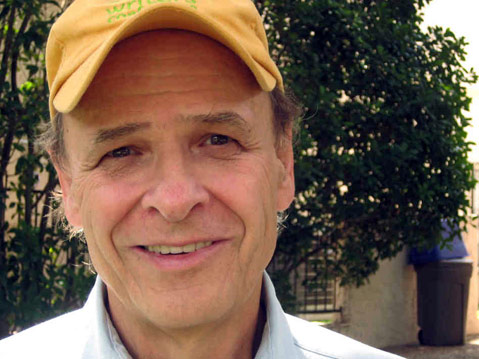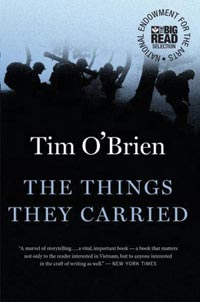Essays From The Big Read
Students and Vets Wrote About Tim O’Brien

n October, the Santa Barbara Public Libraries, with support from the National Endowment for the Arts, presented The Big Read with author Tim O’Brien. Thanks to the Endowment and private donors, 2,500 copies of O’Brien’s Vietnam War novel The Things They Carried were distributed, primarily to area high school students, but also to veterans organizations and other interested groups. As a result, thousands of readers, young and old, were introduced to O’Brien’s work in time for his visit to Santa Barbara during the week of October 21.

O’Brien met with students and veterans at UCSB, SBCC, Santa Barbara High School, and Laguna Blanca School. For many, the highlight of his visit was the public lecture that he gave at Santa Barbara Junior High School’s Marjorie Luke Theatre on Wednesday, October 23. That lecture was videotaped and will be shown on Tuesdays at 10 p.m. on TVSB, channel 71. It is also available as a DVD that can be checked out from the Main Library.
As part of The Big Read Program, students and veterans were invited to submit essays in response to O’Brien’s novel and lecture for a contest, with the winner to be published in The S.B. Independent. Student essays were prescreened by their high school teachers, and the judges for the contest were Hap Freund, The Big Read Outreach Coordinator, and Beverly Schwartzberg, the Library’s director of Adult Literacy Programs. They determined that the following essays should be honored.
Veterans Thomas Elliott and Ron Dexter were both acknowledged for contributing. Elliott’s essay, “The Things They Missed,” recalled a personal letter that Marine Sergeant Elliott wrote to his mother in February 1967 in which he listed the foods that he and his fellow soldiers agreed they missed the most. In “A Few Bad Apples,” U.S. Navy Communications Specialist Dexter reflected on the contradictions inherent in the concept of military justice, especially under true combat conditions.
The student winner and the runner-up were both from Tory Babcock’s class at Santa Ynez High School. David Wagstaffe’s “Testing for the Truth” was judged the best high school student essay, and Connor Meza’s “Fiction” was judged the runner-up. In addition, two other students’ essays were deemed worthy of honorable mention by the judges: “Smoky Memory” by Annika Backelin-Harrison of Santa Barbara High School and “Changes” by Morgan Gainey of Laguna Blanca School. Below, the text of the winner, Wagstaffe’s “Testing for the Truth,” is reprinted in full.
Testing for the Truth
by David Wagstaffe
In the Vietnam-based war book, The Things They Carried, Tim O’Brien constantly toys with the idea of the truth, never conceding a full answer. Throughout O’Brien’s short stories in the novel, he presents antithetic truths and new theories of different types of truth; however, he never answers the questions he poses for the reader. O’Brien shows that war demands an incessant questioning of what is true.
The most obvious question raised by The Things They Carried is whether or not Tim O’Brien actually killed a Viet Cong soldier. He references it early in the novel and even sees “the man he would kill” as he sat on a boat trying to decide if he should defect to Canada. He talks about the emotions and guilt he felt, how he threw the grenade before he even had time to think, and of the “star-shaped hole” that it made. He presents this story and then soon after confesses that it was another man who killed the Vietnamese soldier. With blatantly contradicting accounts from the same man, O’Brien leaves it to the reader to decide.
His writing mirrors war — giving no straight answers. Both in war and in the book, the reader has the power to decide what they want. Did Kiowa really die by sinking in that muddy field? Did Mark Fossie really get his girlfriend to come to Vietnam where she morphed into such a bestial woman? People crave answers, but they are only momentarily appeased if they are spoon fed those answers. The way the book leaves the questions unanswered mirrors the experiences of war. Everyone is right in that they cannot be proven wrong; everyone must test every truth they encounter. Since O’Brien never gives an answer to what truly happened, there is no way to really know. He does, however, formulate a theory about truth.
The author draws a line between what he calls the story truth and happening truth. The prior is when a person expresses something by how they perceive it and how it affects them. There is a lot of room for embellishment in this way. The latter, happening truth, is strictly the facts and the things accepted by all parties present. The relation between the two is like that of connotations and denotations — one describes the emotion that accompanies something and the other is very clear and dry. O’Brien holds that both of these forms of truth are completely reliable; this proposition affects the view of the novel and of war dramatically. The theory originates largely from when the author watches Kurt Lemon step on a mine and blow up. The happening truth holds that the explosion was his end, and yet to Tim O’Brien the story truth was that it was somehow caused by the light and the trees that stole Lemon away.
There are stories of shooting baby buffalo and hearing cocktail parties in the forest and entire cities of people urging someone on. The reader hast to not only determine whether it is true or not but also decide which verity to choose. The Things They Carried engenders 100 times more questions than answers. In the same way, war leaves every soldier with 100 times more questions than answers.
In experiencing warfare, the question of what is true becomes more and more elusive. It leaves the person having to scrutinize every facet of life. Perhaps the reason that so many military veterans have PTSD today is because of the inability to cope with the ephemeral interpretations of truth that a soldier is forced to analyze on a daily basis. As O’Brien put it, “A thing may happen and be a total lie; another thing may not happen and be truer than the truth.” The greatest thing ever learned from war is to keep testing for the truth and to never stop until it is found.



